- Home
- Anne Lamott
Imperfect Birds
Imperfect Birds Read online
Table of Contents
Title Page
Copyright Page
Dedication
Epigraph
ONE - The Parkade
TWO - Memorial Day
THREE - Fenn and Robert
FOUR - The Heat
FIVE - Salt
SIX - The Big Fish
SEVEN - Speck of Light
EIGHT - Twoest
NINE - Lagoon
TEN - The Fall
ELEVEN - Snow
TWELVE - Ox Eye
Acknowledgements
ALSO BY ANNE LAMOTT
Hard Laughter
Rosie
Joe Jones
All New People
Operating Instructions: A Journal of My Son’s First Year
Bird by Bird: Some Instructions on Writing and Life
Crooked Little Heart
Traveling Mercies: Some Thoughts on Faith
Blue Shoe
Plan B: Further Thoughts on Faith
Grace (Eventually): Thoughts on Faith
RIVERHEAD BOOKS
Published by the Penguin Group
Penguin Group (USA) Inc., 375 Hudson Street, New York,
New York 10014, USA Penguin Group (Canada), 90 Eglinton Avenue East,
Suite 700, Toronto, Ontario M4P 2Y3, Canada (a division of Pearson Penguin
Canada Inc.) Penguin Books Ltd, 80 Strand, London WC2R 0RL, England
Penguin Ireland, 25 St Stephen’s Green, Dublin 2, Ireland (a division of
Penguin Books Ltd) Penguin Group (Australia), 250 Camberwell Road,
Camberwell, Victoria 3124, Australia (a division of Pearson Australia
Group Pty Ltd) Penguin Books India Pvt Ltd, 11 Community Centre, Panchsheel Park, New
Delhi-110 017, India Penguin Group (NZ),
67 Apollo Drive, Rosedale, North Shore 0632, New Zealand (a division of
Pearson New Zealand Ltd) Penguin Books (South Africa) (Pty) Ltd,
24 Sturdee Avenue, Rosebank, Johannesburg 2196, South Africa
Penguin Books Ltd, Registered Offices:
80 Strand, London WC2R 0RL, England
Copyright © 2010 by Anne Lamott
All rights reserved. No part of this book may be reproduced, scanned, or
distributed in any printed or electronic form without permission. Please do
not participate in or encourage piracy of copyrighted materials in violation
of the author’s rights. Purchase only authorized editions.
Published simultaneously in Canada
Grateful acknowledgment is made to reprint the following:
James Wright, “A Blessing,” from Collected Poems © 1962 by James Wright.
Library of Congress Cataloging-in-Publication Data
Lamott, Anne.
Imperfect birds : a novel / Anne Lamott.
p. cm.
eISBN : 978-1-101-18634-3
1. Drug addicts—Fiction. 2. Parents of drug addicts—Fiction.
3. Psychological fiction. 4. Domestic fiction. I. Title.
PS3562.A
813’.54—dc22
This is a work of fiction. Names, characters, places, and incidents either are the product of the author’s imagination or are used fictitiously, and any resemblance to actual persons, living or dead, businesses, companies, events, or locales is entirely coincidental.
While the author has made every effort to provide accurate telephone numbers and Internet addresses at the time of publication, neither the publisher nor the author assumes any responsibility for errors, or for changes that occur after publication. Further, the publisher does not have any control over and does not assume any responsibility for author or third-party websites or their content.
http://us.penguingroup.com
For Bonnie Allen and Jax Lamott
For Doug Foster and Neshama Franklin and the people of
St. Andrew Presbyterian Church
Thanks beyond words.
Just off the highway to Rochester, Minnesota,
Twilight bounds softly forth on the grass.
And the eyes of those two Indian ponies
Darken with kindness.
They have come gladly out of the willows
To welcome my friend and me.
We step over the barbed wire into the pasture
Where they have been grazing all day, alone.
They ripple tensely, they can hardly contain their happiness
That we have come.
They bow shyly as wet swans. They love each other.
There is no loneliness like theirs.
At home once more,
They begin munching the young tufts of spring in the darkness.
I would like to hold the slenderer one in my arms,
For she has walked over to me
And nuzzled my left hand.
She is black and white,
Her mane falls wild on her forehead,
And the light breeze moves me to caress her long ear
That is delicate as the skin over a girl’s wrist.
Suddenly I realize
That if I stepped out of my body I would break
Into blossom.
—JAMES WRIGHT, “A Blessing”
ONE
The Parkade
There are so many evils that pull on our children. Even in the mellow town of Landsdale, where it is easy to see only beauty and decency, a teenager died nearly every year after a party and kids routinely went from high school to psych wards, halfway houses, or jail. Once a year a child from the county of Marin jumped off the Golden Gate Bridge.
Elizabeth Ferguson looked around at the Saturday-morning comings and goings of townspeople, and saw parents who had lost or were losing their kids, kids who had lost or were losing their minds. She and James sat with their coffees and newspaper on the wide steps of the Parkade, which was what everyone in town called the parking bay in the center of town, making it seem a lot more festive than it was. It was a big parking lot that abutted the boulevard that ran from San Quentin, to the east, all the way out to Olema, on the Pacific coast, but several feet higher than the town’s original crossroads, so that you had to climb up steps to reach it, and drive slightly downhill to exit. A bean-shaped lot for eighty cars, it was ringed in skinny trees and foliage, lavender rhododendrons whose blooms wouldn’t last much longer as spring faded, and geraniums. There was a bus kiosk on the north side, and two weathered sets of concrete steps, the one where Elizabeth and her husband sat reading, another at the far end, across from the movie theater.
She and James were waiting for her daughter, whom they were going to take shopping in town if she ever arrived. Rosie needed notebooks and some summer tops for her last weeks as a junior at the local high school, and shops fanned out below the Parkade, stretching almost to the northern face of Mount Tamalpais. But Rosie was nowhere in sight.
Elizabeth felt large and worried. Even sitting down, she was taller than her husband (and her otherwise dark thick hair was slightly more gray-streaked). But Rosie was taller than either, almost five-eleven, black-haired, strapping and fabulous, except when they wanted to disown her, like now.
James read the paper in vexed silence and Elizabeth sipped her coffee and watched people go about their business. A tidal feeling ebbed and flowed around them, of people on foot, shopping or going back to their cars. You never knew for sure who would be there, someone you’d been missing or were trying to avoid. Two teenage boys took their spots on the bottom steps. Their pose was a flop that said, I’ve arrived and I’m not moving. Others stepped past them to get to their cars or up to the boulevard. Over by the bus kiosk there was a sense of marketplace transactions among the high school kids—punk, funk, hippie, straight—of intrigue, nonchal
ance, commerce, boredom, opportunity. On the main street people dropped off DVDs and videos, stopped to chat, ducked into the liquor store, flirted, picked up after their dogs or not, riffled through dresses hanging outside on racks. Elizabeth read the paper over James’s shoulder.
“How long are we going to wait?” he asked. “It’s been twenty minutes.”
“Five more?”
“It’s like waiting for goddamn Godot.”
Some of the young men converging at the kiosk had cultivated the look of homelessness, but without the inconvenience and hardship: car keys dangled from their belts as they drank four-dollar lattes. Some looked like star athletes, because they were or had been. But you saw a feral, dark energy in some of the young here, of despair, blankness, failure and indirect gazes, ill health, or sometimes, a dangerous raw male potency. The grunge, the piercings, the clothes that deliberately didn’t fit, that said, I am the best, I am the worst, the tattoos psychic Band-Aids to cover the wounds.
They were home here, and only here. You could tell by the loose-legged swagger, instead of the back-alley prowl they used at their parents’ houses.
Some of these guys had been to Elizabeth’s home in the year since she and Rosie and James had moved here from Bayview. Two were Rosie’s friends from school, and one had briefly had benefits, which meant she had given him oral, as they called it, which Elizabeth had learned by reading Rosie’s journal. She had had to do Lamaze after reading the entry about Rosie’s giving Jason Brewer head. Rosie had lambasted Elizabeth after guilt forced her to admit having read the journal, and so she rarely admitted to Rosie that she dipped into the journal from time to time. Also, Rosie began hiding it better, but Elizabeth could always find it eventually, hidden in tennis racket covers, hollowed-out books, behind the headboard, under the dresser and night table.
Elizabeth rationalized it as recon, and found herself reading the journal on a regular basis. When she got new intel that she did not tell Rosie she knew, she obsessed about the dreadful news—for example, that Rosie had tried cocaine a few times last summer, and smoked cigarettes every so often. And when Elizabeth did admit to snooping—for instance, when she’d discovered that Rosie was not a virgin—Rosie rightfully went crazy and didn’t speak to her for days. When Elizabeth tried to break the habit and go without any new information, she fixated on the grisly teenage possibilities. So it was torture in any case, as Elizabeth had to try to keep the files straight in her head: what she knew and had admitted to, what she knew but must keep a secret, and what were only her dark imaginings.
So Rosie had given guys head, gotten laid, and done cocaine a few times: for God’s sake, what did Elizabeth expect? It was not ideal, but Rosie was seventeen and gorgeous and had been on the pill, for an overly heavy monthly flow and acne, since she turned fifteen. Her skin was under control now, with only small clusters of pimples, and she got much less crazy every month. The mention of cocaine upset Elizabeth, but it was apparently in the past, having not been mentioned again in the journal.
Rosie’s guys had smelled of marijuana the times Elizabeth had been close enough to sniff, and she had found a pack of rolling papers while snooping in Rosie’s purse a few months ago, but she rarely smelled weed on Rosie. They had apparently dodged a bullet when it came to drugs, knock wood. Kinna hurra, kinna hurra, as Jewish friends exclaimed, laughing while knocking wood or their own heads: no evil eye.
James glanced up from his paper again. He sighed heavily but got into people-watching with Elizabeth: yoga ladies with their baseball caps and rolled-up mats leaving the yoga studio; people in groups and couples and alone, shopping at the health food store or at Landsdale Hardware and Lumber, at the foot of where the mountain would usually be. It was missing today, but the fog was supposed to burn away by noon. She looked at James surreptitiously, with a sad and mooning face; she loved him so much. He was not the tall, handsome man her first husband had been, elegant and calm and amused. But he was her perfect companion much of the time, and she loved his looks: his crazy frizzy hair had been cropped and styled now. He had told his hairstylist to make him look like the gay scion to a great fortune, and she had. He’d also had his front teeth capped, so while he was never going to star in toothpaste commercials, he had the sweet pleasing smile of someone with a lifelong shyness about his teeth.
As they sat on the steps, James pointed out a tiny Ralph Steadman dog on a red leash. “It looks like an ink-blot test,” he whispered. “Like a little chemo dog.”
“It’s a soap-on-a-rope dog,” she replied. She laid her head against his shoulder while he scribbled this down in his notebook. He was the smartest person she had ever known, on literature, politics, psychology, and yet he could also be so dorky, with the silly Monty Python walks and weird voices that still made Rosie laugh, most of the time. On the wrong day, however, she might announce snidely that this or that behavior was the main reason she wanted to move out. For the ten-plus years since he’d entered their lives, James had been making the same dumb jokes. But people always laughed, which encouraged him. Passing diners at outdoor tables or in the park, he’d peer at their food and ask eagerly, “Are you going to finish that?” and everyone laughed. It had begun to embarrass Rosie a few years ago, but she always forgave him for being so corny. “Don’t pet the sweaty stuff,” he’d tell her friends when they seemed upset, a line he’d gotten from one of the many doctors he and Elizabeth now needed to tend to their deteriorating body parts.
They had problems now in areas where they hardly used to have areas. They both wore glasses. James had had two skin cancers removed from his widening bald spot. Elizabeth had a hammertoe and ensuing gigantic corns, which always grew back after removal. James’s best friend, Lank, had a bad rotator cuff. Rae, his wife and Elizabeth’s best friend, was getting carpal tunnel syndrome from the years at her loom, and wore a wrist brace. Both women leaked urine if they laughed or coughed too hard. Elizabeth had to wear napkins all the time now, and was not even fifty.
Everyone’s back ached except Rosie’s. But Rosie had a visible glob on one eye from sun damage, seven years on tennis courts for ten hours a day. Also, Lank had such terrible vision now that no one would drive with him at night, even though he wore glasses, which magnified his already big brown eyes to the size of a rainforest mammal’s. He had lost a lot of his hair except for a light red fringe that he kept short. Rae often stroked his head and cooed like a lap dancer about how soft and sexy it was. He had had a melanoma removed from his upper arm, probably the result of all the years he and James had backpacked together. They had met Rae and Elizabeth on a trip to Yosemite, coming up on eleven years ago, but they rarely camped anymore, because of bad backs, aching feet, and skin cancers.
But by their age, so many wonderful people in their lives had died or were going to die soon; and besides, they were all in relatively good health. So when the sun came up, you felt around for glasses, got out of bed, limped about on stiff feet, and slathered on sunscreen, grateful for the poignancy of daybreak.
James, who was usually so mellow, could be stern and pissed off at Rosie. She could make him lose his mind, especially when she was cruel to her mother. He periodically grounded her and took away her allowance, something Elizabeth did not always agree with, as she felt that Rosie, a year away from graduation, was too old to treat like a child. James, on the other hand, felt that if you didn’t use parental muscle and control, the homework didn’t get done, classes got skipped, grades would fall off, and Rosie would have to go to a junior college, and they’d be stuck living with her defensive moods and contempt for another year or two. He had become the primary disciplinarian around the time Rosie turned sixteen, when she began to plead for more and more independence, because unlike Elizabeth, he did not fear Rosie’s wrath or worry about being seen as the bad guy, all that stood between her and eternal joyful congress with her friends. In fact, he seemed to enjoy the role of enforcer.
On good days, when everyone got along, Elizabeth believed she’d die
when Rosie left, keen forever like an Irish fisherman’s widow. On bad days, she felt like a prisoner at the Level 1 Reception Area in Pelican Bay, marking off days on the prison wall until Rosie’s graduation.
James had first called Rosie the angry clubfoot in the early weeks of his romance with Elizabeth, as they drunkenly listened to her clomp around upstairs in a bad mood, resentful that James was stealing away her mother. And she still fit the bill on a regular basis, although to judge from anecdotal evidence that Elizabeth culled from other mothers, Rosie was not nearly as awful as many of the town’s teenage girls, not by a long shot. She did not scream, hit, run away, or throw things. She had not gotten pregnant—Elizabeth knew of at least four girls who’d gotten abortions. Still, life with most teenagers was like having a low-grade bladder infection. It hurt, but you had to tough it out.
Lank, who taught high school in Petaluma, had responded to Elizabeth’s periodic misery by inventing a church just for her, called Seeing the Light Ministries. Not long ago, during an awful patch between Elizabeth and Rosie, Lank had, in his capacity as pastor, reminded Elizabeth of the doctrine against raising your kids as if they were precious equals. This seemed to be the current national parenting trend, but it was utterly misguided.
“You are the sun,” he told Elizabeth over the phone. “The child is merely a moon. A moon. She has no light of her own, no income, no car. She is a satellite. Her judgment is frequently poor, and she is mean. She is South Africa before the revolution, cruel and crazy. Divest! Divest!”
Elizabeth knew this was the path toward freedom, away from the tweaking and gnashing of teeth, but it was so hard not to hook into Rosie’s teenage bullshit; hard not to react when Rosie was arrogant or cutting or blinked at her like a lizard and walked away while Elizabeth was in mid-sentence. Lank provided Elizabeth with Seeing the Light responses to everyday demands, such as “Roise? The instructions are inside the lid of the washer.” He had an all-purpose response to any teenager trying to provoke a fight: the silent chanting of a mantra, which was WAIT, for “Why am I talking?” Parental non-engagement drove Rosie crazy and out of the room.

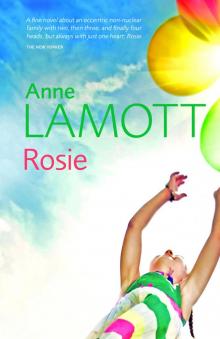 Rosie
Rosie Crooked Little Heart
Crooked Little Heart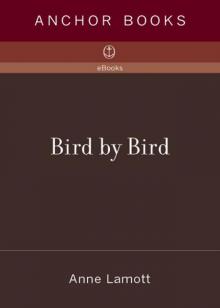 Bird by Bird: Some Instructions on Writing and Life
Bird by Bird: Some Instructions on Writing and Life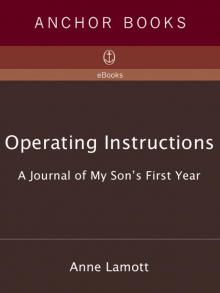 Operating Instructions: A Journal of My Son's First Year
Operating Instructions: A Journal of My Son's First Year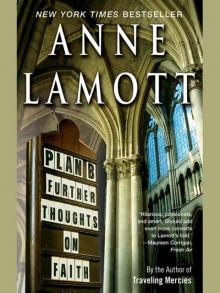 Plan B: Further Thoughts on Faith
Plan B: Further Thoughts on Faith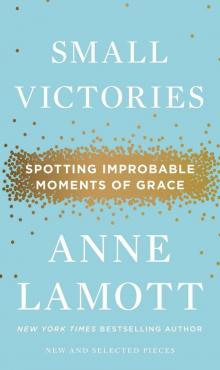 Small Victories: Spotting Improbable Moments of Grace
Small Victories: Spotting Improbable Moments of Grace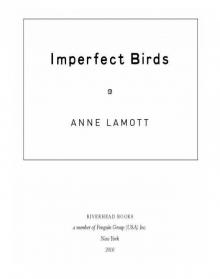 Imperfect Birds
Imperfect Birds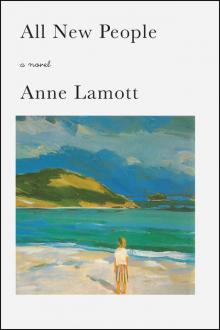 All New People
All New People Grace (Eventually)
Grace (Eventually)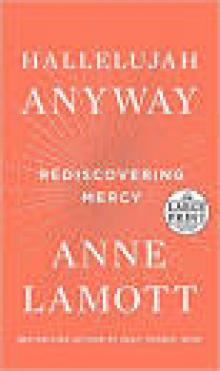 Hallelujah Anyway
Hallelujah Anyway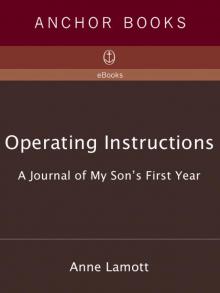 Operating Instructions
Operating Instructions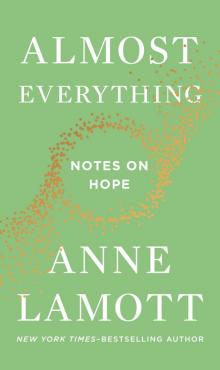 Almost Everything
Almost Everything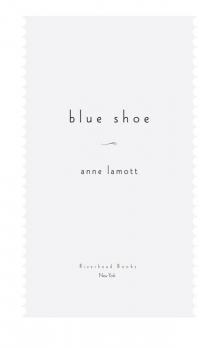 Blue Shoe
Blue Shoe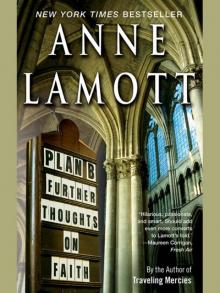 Plan B
Plan B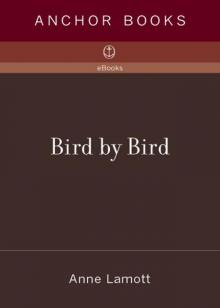 Bird by Bird
Bird by Bird